Peter MALONE
Saturday, 18 September 2021 19:30
Hell's Highway
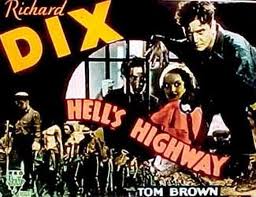
HELL'S HIGHWAY
US, 1932, 62 minutes, Black and White.
Richard Dix, Rochelle Hudson.
Directed by Rowland Brown.
Hell's Highway is one of several chain gang films made in the early '30s, the most famous of which was Mervyn Le Roy's 1 Was A Fugitive From A Chain Gang. This kind of prison film has been a constant in movie history - a prominent '60s example was Stuart Rosenberg's Cool Hand Luke with Paul Newman.
This film, written and directed by Roland Brown (Quick Millions, Blood Money) portrays the chain gang effectively - even with some brutality. It has as its target politicians and land and road developers of the early '30s. The characters are conventional tor this kind of film but drawn with conviction and strength. Music is by Max Steiner.
1. The popularity of this kind of '30s melodrama? As drama, as social comment and protest? in retrospect?
2. The quality of black and white photography, Max Steiner's score? The authenticity of locations? Brevity? The transition from silent film to sound: the use of sound, editing, the use of profiles and captions?
3. The dedication and the serious intention of the film? The newspaper prologue with headlines about the use of sweatboxes for prisoners, deaths? The film's portrayal of prisons in the '30s? The severity of punishment? The work of the chain gangs? The building of the roads? Administration, the guards political and financial corruption? The need for exposure?
4. The atmosphere of the desert, the irony of the road and its being called Liberty Road? The harshness of the chain gang atmosphere, the quarters, the prisoners in chains, the work of the guards and their attitudes, the boss, the Billings and his finance and wanting the road to be opened, the poor quality of the food, the dormitories, the accountability of the guards to
Billings? His use of the sweatbox? importing it? The governor and his interest? The need for investigation?
5. The background of the prisoners, their crimes, the effect on them, bitterness, escape, their being returned to the gang?
6. Duke as hero? Tough, his place in the gang, the background of his robbing banks? his decent style? his protest? Strength at work? Friendship with Matthew? The set-up for the escape, the hold over the guard who had killed his wife? His brother's arrival, his responsibility for his brother, his decision to return? The clash and his brother going to the sweatbox? Deals with authority, fights? The fight with Max? The visit of his mother and his brother's girlfriend? The gun, the escape, carrying his brother back?
The final confrontation with Billings?
7. Matthew and his ironic humour - the American larrikin and the deadpan irony? The religious overtones? The humorous effect tor this grim film?
8. Max and his glasses, the cook and his swish style, the deaf prisoner - and his being killed because he couldn't hear?
9. The picture of the negro prisoners, prejudice, their work, their singing? The reaction to Popeye?
10. The boss and his sadism, employment by Billings, playing the violin? The guards? Popeye and the taunting of him and his discovery of his wife, killing her?
11. Billings and his use of the sweatbox? his exposure?
12. Authorities, Whiteside and his investigations, his use of the young boy, the recommendations?
13. The value of the social comment of the film, its strength, its taking sides?
Published in Movie Reviews
Published in
Movie Reviews
Tagged under
Saturday, 18 September 2021 19:30
He Knows You're Alone
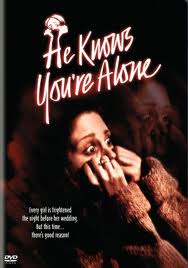
HE KNOWS YOU'RE ALONE
US, 1980, 94 minutes, Colour.
Don Scardino, Caitlin O' Heaney, Elizabeth Kemp, Tom Rolfing.
Directed by Armand Mastroianni.
He Knows You're Alone is one of the thrillers in the cycle started by John Carpenter's Halloween. Others include Prom Night and Terror Train. The plot is obvious in its way - a variation on the Halloween theme. However, it is quite effectively done and there are some scary sequences. There is a focus on a heroine pursued by a psychotic murderer. The motivation is suggested: the jilting of a bridegroom and this recurs ironically at the end of the film.
There are the obvious contrivances but they work quite effectively. The star is Don Scardino who appeared in the animal menace thriller Squirm and as the gentle homosexual playwright in Cruising.
1. The appeal of this kind of thriller: the tradition of Psycho, madness, violence, the motivation for murder and poetic justice? The nightmare aspects of these thrillers? Vicarious thrills and anguish? Playing on audience fear, fear of violence and death?
2. The cinema tradition of this kind of thriller - Hitchcock, Psycho? The impact of the opening? The irony of having the initial murder on screen and the discovery that it was a film within a film? The girl in the audience watching and the surprise of her murder in the theatre? Potential for scaring the cinema audience? A satisfactory prologue to this kind of thriller?
3. Colour photography, locations? The importance of editing for pace, scares and shocks? The borrowings from the knife-wielding thrillers of the '70s?
4. The importance of motivation? The policeman and his memory of his fiancee's murder? His obsession with tracking down the killer? The murderer and his being jilted? His pursuit of girls about to be married? The murder of people associated with his victims? Marvin as intervening in Amy's life, her marriage? The parallel for the ending? The neatness of the final effects for the film?
5. How well did the film establish the atmosphere for the first murder and play on that?
6. The focus on Amy as heroine? Phil and his love for her, his friends and the stag party weekend - and their behaviour with the girls they took? Audience antipathy towards him? The contrast with Marvin and his friendliness, devotion to Amy, pursuit of her? His scaring her at times? His work at the morgue? Amy and her girlfriends and their girl talk - in such sequences as the ballet training? The discussion about Joyce and her boyfriend at College? The build-up to Ralph and his making the dress for Any - and the manner of his murder? Joyce and her being terrorised in the bedroom? Nancy and her not going out, the menace in the house and the ugliness of her death? Marvin and his being terrorised? The atmosphere of terror, doubts? The scares in the house, the car pursuit, the finale in the morgue? The terrorising of Amy - her discovery of Nancy, the visit to the morgue? The pursuit by the murderer?
7. The portrayal of the killer - the audience seeing him, his appearances and disappearances - e.g. outside the house, at the carnival? His ability to anticipate Amy's moves, moving around the town? The jilting and his being unhinged - how credible?
8. Marvin as hero - genial, humorous, helpful? His participation in the finale? His being the hero when the obsessive policeman was killed?
9. The atmosphere of the small town - Ralph and his shop, the priest and his friendship with Nancy and the advice, the girls and their talk, Elliott, the way of life the morals of the small town?
10. The portrayal of the killer - enough menace for the audience? The murder of Ralph, of the university lecturer and Joyce, Nancy and the echoes of Psycho and the shower and bath sequences? His prolonged presence throughout the film?
11. An atmosphere of fear with death, knives? How exploitive was the material? How entertaining? The ultimate effect on the audience - how satisfying this kind of thriller, how disturbing?
Published in Movie Reviews
Published in
Movie Reviews
Tagged under
Saturday, 18 September 2021 19:30
Helen of Troy
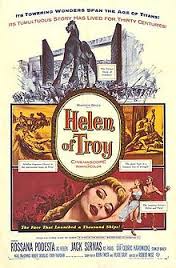
HELEN OF TROY
US/Italy, 1955, 118 minutes, Colour.
Rosanna Podesta, Jacques Sernas, Cedric Hardwicke, Niall MacGinnis?, Stanley Baker, Nora Swinburne, Robert Douglas, Torin Thatcher, Harry Andrews, Janette Scott, Ronald Lewis, Brigitte Bardot.
Directed by Robert Wise.
Helen of Troy is a matinee version of the famous events of Greek history and mythology immortalised in the Iliad by Homer. This film was designed for the new Cinemascope process in the early '50s. It has an international cast led by an Italian Helen and a French Paris. The majority of the cast is English. However, Brigitte Bardot can be seen in a supporting role as Andraste.
The film has lavish Warner Bros production values, is directed by Robert Wise with a score by Max Steiner. However the film focuses mainly on displaying the events and characters rather than exploring them. The film might be compared with smaller budget, but more entertaining Greek mythology films like Jason and the Argonauts.
1. An enjoyable presentation of famous mythological events? Characters? The Trojan War?
2. Cinemascope photography, locations, decor and costumes, ancient atmosphere? The battle of Troy? The wooden horse? The editing and pace for the Trojan War? The musical score?
3. Audience familiarity with the characters and events? A popularising of these events?
4. The situation in Sparta: the negotiations between the Trojans and the Spartans, Paris's visit to Sparta, the encounter with Helen, her pretence that she was a slave, the clash with Menelaus? Helen's helping Paris to escape from prison? The return to Troy? The situation for a battle?
5. The Trojan situation: the court of Troy, the defence of Troy against the Greeks? Helen alien in the city? The arrival of the Greeks, the warriors, the battles, the clash of heroes? The device of the Trojan horse? The restoration of Helen to Menelaus?
6. The focus on Paris, as negotiator, the shipwreck, discovery by Helen, her pretence that she was a slave, his going to the palace, the tricks by Menelaus and the advisers, his imprisonment, his escape, the return to Troy, the reaction of the Greeks, the reaction of the Trojans, his family, the effects of the war, his death?
7. Helen and her beauty, as wife of Menelaus, discontented, the finding of Paris, love for him, her helping him from prison, her leaving Sparta and going to Troy, the reaction of the Trojans, her part in the war, the return to Menelaus?
8. Menelaus and the court of Sparta, his advisers? The imprisonment of Paris? The betrayal by Helen? The declaration of war? His brother Agamemnon and the warriors? Ulysses? The waging of the battle, the wooden horse, victory?
9. The traditional Greek heroes: Achilles and his skills, his heel? Agamemnon and his power? Ulysses? A sympathetic portrayal of the Greeks?
10. The Trojans: King Priam and his rule of Troy, the effect of the siege, the defeat of Troy? Hecubah and her daughters? Cassandra and her prophecies of doom? Aeneas, Hector and the Trojan warriors? The battles? The wooden horse? The defeat?
11. A popular ancient story of passion, betrayal, war? Its relevance to succeeding generations?
Published in Movie Reviews
Published in
Movie Reviews
Tagged under
Saturday, 18 September 2021 19:30
Hell Drivers
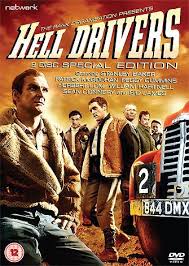
HELL DRIVERS
UK, 1957, 108 minutes, Black and white.
Stanley Baker, Patrick McGoohan?, Herbert Lom, Peggy Cummins, William Hartnell, Wilfred Lawson, Sidney
James, Jill Ireland, Alfie Bass, Gordon Jackson.
Directed by C. Raker Endfield.
Hell Drivers is a tough action film from Britain in the mid-'50s. it has strong credits including photography by Geoffrey Unsworth in Vistavision. The cast is very good - and abounds in character actors and actresses.
Writing and direction is by C. Raker Endfield, later Cy Endfield of the Zulu films. At the time, many critics considered it too tough. However, it anticipated some of the ruggedness of the films of the '60s e.g. The Angry Silence and unions, though it resembles some of the tough Warner Bros. films of earlier decades e.g. They Drive By Night and even its contemporary On The Waterfront.
1. An interesting film? As action drama? Situations? Britain in the '50s? Character study?
2. Black and white photography, Vistavision? The technical credits? The effects for the truck-driving and especially the competitiveness and racing? Violence? Musical score?
3. The English tradition of realism? Situations, characters, interactions? A slice of life? Comparisons with American films on the same themes? Social comment and observation? In retrospect - a picture of workers in the '50s?
4. The plausibility of the plot: the world of the truckies, of industry, of haulage and the masculine social behaviour associated with it and expected of the drivers? Personal clashes? The background of prisons, city life, poverty? Easy money? Clashes? Romance?
5. Stanley Baker as Tom? His arrival at the haulage centre? The test? His privacy? Name? Relationship with Cartley and being employed? With the rest of the men - and the humiliations and jokes? Red's place at table - and Red being the leader? The inevitable confrontation, races, dirty tricks, success? The friendship with Gino and sharing lodgings with him? Support of Gino and Gino's suffering for Tom? The attraction towards Lucy? Relationship with the rest of the men? Tom's time off - dances, privacy? The boarding house? His visit to London and his mother's attack? His injured brother? His return and the confrontation with Red? The devices to beat Red? Red's death? A portrait of a tough but sensitive hero?
6. The picture of the rest of the men - Gino and his Italian background, prejudice against him, his praying, friendship with Tom, supporting him in the competitions, his being bashed? Dusty and the others and their initial reaction against Tom? Their gradual support of him? Sid James, Alfie Bass, Cordon Jackson and the strengths of the characterisations?
7. Red as arrogant? What Tom might have been? The reaction of the rest of the men? His self-assertion and menace? The confrontations, the blocking with the trucks, the short cuts, the hell-driving? The violence and Red's attempt to destroy Tom? Red's death?
8. The background of the rackets? The skimming off of the money? Cartley and the bosses? Red and his place in the racket? Lucy and her reaction? The realism of this kind of crookedness?
9. Lucy as attractive heroine? Working? Interest in Tom, gradually getting to know him, falling in love?
10. Tom's mother and her violent reaction to her son, the prison sentence, his being out? His brother and his devotion?
11. The range of minor characters - the landlady, her daughter and her work in the shop? A sense of authenticity and real characters?
12. The images of work, competitiveness, bosses, corruption? The strong image for men and their having to live up to it? How accurate a portrait of these men of the '50s?
Published in Movie Reviews
Published in
Movie Reviews
Tagged under
Saturday, 18 September 2021 19:30
Hell in the Pacific
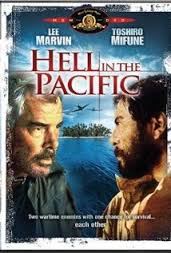
HELL IN THE PACIFIC
US, 1968, 103 minutes, Colour.
Lee Marvin, Toshiro Mifune.
Directed by John Boorman.
Hell in the Pacific is a film by John Boorman, made after Point Blank and before Leo the Last, much before Deliverance and Zardoz. It shows Boorman's technical skill, especially as there are only two characters in the film. It raises questions of warfare and the meaning of war outside the accustomed European battlefields. Two pilots, an American and a Japanese marooned on an island, carry on their nations' war against one another, humiliating one another, until common humanity wins out and they join to fight for survival against nature. This obvious theme which is well acted by Toshiro Mifune, tough yet dignified and Lee Marvin as the typical laconic wise-cracking, resourceful Yank. Why war? Because common humanity is forgotten by inhuman ambition and pride. This is quite an entertaining film with a message. Two endings were made: one with the two surviving, the other with them being destroyed. Both were released.
1. The significance and tone of the title? Criticisms that it sounded like a typical war film? That it did not fulfil the expectations? The significance of the title in reference to this film and its themes?
2. The importance of the use of Panavision, colour, Pacific locations, the environment of the islands? The use of music? Dramatic, American and Japanese melodies woven into the themes? The comment on the characters?
3. Audience pre-suppositions about war films? In terms of action, message, characters? How typical a war film was this?
4. The theme of war and anti-war? The taken for granted aspects of the war setting. the hostilities of the two men. the seeming futilities of the war? The microcosm and futility of war on a large scale? How strong was the message of the folly of war?
5. The use of the 'Robinson Crusoe' theme? Robinson Crusoe using Friday? American using Japanese and vice versa? The insight into this kind of relationship in isolation?
6. The theme of human survival? Eating, resting? Encountering the enemy? Compromise and coming to terms? Collaboration for survival? The moving away from isolation etc.? How well visualised and explored?
7. The theme of civilization and the lack of civilization? The American presuppositions for survival, Japanese traditions? The use of the two in isolation? The conflict? The collaboration? What is the essence of civilization? In remote places? When they returned to the enemy camp? The trappings of civilization and the growing hostility? Death?
8. How well drawn was the American character? Lee Marvin as the typical American? As a person, language, communication? Hard and tough? Soft and sentimental?
9. The Japanese character in contrast with the American? Toshiro Mifune as the typical Japanese? His background and traditions, style? The conflict with the American? The collaboration?
10. The details of their hounding and stalking each other in the jungle? How serious, the ironic and humorous side?
11. The use of fire to hound out and destroy the other? The image of hell?
12. The practical details of food, water, sleep, work?
13. The physical confrontation? The use of weapons, sword and gun? The mutual capturing? The mutual humiliation? The use of a cross and its religious significance? Working and resting? The quarrels?
14. The compromise and their working with one another? For food and survival? The raft? The serious and humorous aspects of the building of the raft?
15. The sequences on the sea and the move towards civilization? The sea as a symbol of the wild isolation?
16. What did they achieve by arriving at a place of civilization? The re-provoking of the war? The drink, the magazines about the atrocities, patriotism and jingoism, the argument about God?
17. What was the significance of what they discovered in the deserted army post? The trappings of civilization and the hostility in the clash? What future was there for them? What future for the countries involved in war? The inevitability of clash?
18. The problem of the two endings: of the two going on their various ways, of a sudden explosion and their death? Which was the more fitting for the themes and values of the film?
Published in Movie Reviews
Published in
Movie Reviews
Tagged under
Saturday, 18 September 2021 19:30
Hellstrom Chronicle, The
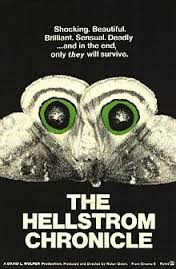
THE HELLSTROM CHRONICLE
US, 1971, 93 minutes, Colour.
Lawrence Pressman.
Directed by Walon Green.
The Hellstrom Chronicle is science-fiction designed as documentary or 'science-fact'. Its thesis is that insects have survived the process of evolution best of all creatures so far and that they will out-survive man. In fact, they are well on the way to doing so unless man realises how much he is affected by them - disease, irritation, crop destruction and so on. But, of course, man doesn't and so the film suggests that he is marked for destruction. The points are made less convincingly by Dr. Hellstrom, who turns out to be a fictional character (played by Lawrence Pressman).
They are made most convincingly by some of the most beautiful and frightening colour photography and micro-photography ever shown on the screen. Insect life is shown as cruel and beautiful and as a power for survival.
The film ought to be discussed. It won an Oscar for the Best Full-length Documentary of 1971.
1. Did you expect this film to be a documentary or a science fiction film? What did the title suggest?
2. Were you convinced by the opening credits and by the appearance of Nils Hellstrom that Hellstrom was a genuine person? Were you surprised to find at the end that he was a fictional character? Did this change your outlook on the film? Change the impact? Lessen the credibility?
3. What kind of personality did Hellstrom have? Why did he stress the fact that people had called him a fanatic? How did he use the fact that people did not believe him and he had lost important positions to make his message more authentic and convincing?
4. Were the interview scenes well thought out - e.g. Dr. Hellstrom watching an old science-fiction film to point out man's popular imagination as regards insects; the drive-in, etc?
5. How did the colour photography of insect life impress you? Why?
6. Did you understand the point about insects' adaptability and capacity for survival? Why could they outsurvive man?
7. How dangerous are insects to man? Did you find the film convincing about these dangers or were they exaggerated?
8. What impression did the close-ups of the insects and their devouring of one another make? Were they meant to frighten the audience as to what could happen to man?
9. Did the film show insects to be beautiful at all - e.g. butterflies? Did such sequences take some of the terror out of looking at devouring insects?
10. How important were the locust sequences for the film? Is this plague a thing of the past? What point was made about DDT and other poisons? Does this mean that plagues of locusts are ultimately uncontrollable?
11. After thinking about the previous questions, why, would you now say, the film was made at all? What was its message? How serious were the film makers? How much of the film do you think was merely to show the photographer's skill at micro-photography?
12. How seriously did you take this film? How seriously do you think most audiences would take it? How much influence on public opinion would a film like this have? Why?
Published in Movie Reviews
Published in
Movie Reviews
Tagged under
Saturday, 18 September 2021 19:30
Hennessy
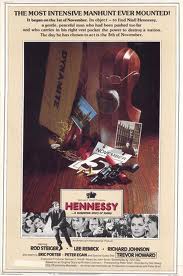
HENNESSY
UK, 1975, 104 minutes, Colour.
Rod Steiger, Lee Remick, Richard Johnson, Trevor Howard, Eric Porter.
Directed by Don Sharp.
An effective thriller always makes good entertainment. This one is quite satisfying. It takes the present Irish troubles as its setting, does not exploit them for cheap thrills or melodrama, but gives some insights into the feelings of the people involved. Rod Steiger is quite convincing as Hennessy, the loner determined to destroy as much as he can in retaliation for his own suffering. Richard Johnson matches him as a tough, gruff Scotland Yard investigator. Newsreel footage inside and outside the British Parliament is cunningly edited into the film, giving it a feel of authenticity. This is one of those films that one can readily recommend.
1. How successful a thriller? The film's use of suspense conventions? The focus on the person of Hennessy as centre for the themes?
2. The film's use of the 70's interest in Northern Ireland? In spectacular crime of the 70's? Did the film exploit this or use the backgrounds well? For something more than a thriller?
3. How adequately did the film present the sequences in Ireland? The Belfast riots, the people involved, ordinary work, the police, the provocation of the police? Hennessy's situation within this Ireland? The contrast with London? Way of life there, for example Kate? Scotland Yard and its personalities and quests? Parliament?
4. What was the impact emotionally of the Belfast sequence? Could audiences understand the right and wrong of Belfast? The violence? Death? Reprisals? The emotional overtones of the wake?
5. The presentation of the Irish: Toby and the IRA? The people at the wake? Hennessy and his family? Kate? The contacts and agents in London?
6. The initial presentation of Hennessy, family before violence? His refusal of Tobin? The impact of the death and his snapping? What happened to him after the death? His refusal of Tobin's protection?
7. How plausible was Hennessy's plan? His violence? Escape to London? Eluding Tobin's men by killing them? Using Kate? Getting the gelignite? Studying Burgess? Taking his place? The plan for as many deaths as possible? How did suspense mount on this issue throughout the film?
8. The character of Burgess and the detailed presentation of him speaking, his home life, the suspense of the phone call while Hennessy answered, the climax of Burgess-Hennessy? going to the parliament? The anti-climax of his being stopped?
9. How important was it that the audience knew the details of the plot? Suspense? The atmosphere of reality by the use of newsreel material? What was real and what the drama edited in? How skilfully and plausibly?
10. The personality of Tobin, understanding the I.R.A. and its administration. Its goals and ruthlessness, its awareness of public opinion, its political role? Tobin and his control over this men? Working parallel to Scotland Yard? Trying to kill Hennessy?
11. Date and some sense of humanity? As an I.R.A. widow? Her work in London? Friendship with Hennessy? Allowing him to stay? Not knowing what was going on? Relenting and letting him escape? The suddenness and irony of her death? As a symbol of the victims of I.R.A. warfare?
12. The importance of Hollis? The Englishman, the tough professional, the importance of the flashbacks and his brutalisation in Ireland, his absorbing the violence? The tough policeman? Ordering Williams about? His ability to follow through. and his shrewdness? His pushiness with Rice? The achievement of discovering what Hennessy did? His involvement in the parliament? Hennessy's death? How rounded and credible a character was Hollis?
13. The contrast with Williams? Young, an assistant, heroic on the car? The irony that Williams dies?
14. Rice and his management of Scotland Yard? The political liaison? The protection of the Royal Family etc.?
15. The film's use of detail: its build-up of locations, pace, music, sense of realism? The emphasis on deaths and the people who died?
16. How valuable an insight into Ireland of the 70s and its feeling? For example Hennessy and Hollis watching the T.V. funeral? People's freedom? Heritage? Did the film offer any insight to solution?
Published in Movie Reviews
Published in
Movie Reviews
Tagged under
Saturday, 18 September 2021 19:30
Hell on Frisco Bay

HELL ON FRISCO BAY
US, 1955, 98 minutes, Colour.
Alan Ladd, Edward G. Robinson, Joanne Dru, Paul Stewart, William Demarest, Fay Wray.
Directed by Frank Tuttle.
Hell On Frisco Bay is an entertaining gangster story set in San Francisco in the '50s. It uses Cinemascope and colour and has a star performance from Alan Ladd matching himself against Edward G. Robinson - in roles familiar from the '30s as in Little Caesar and in the '40s as in Key Largo. There is a substantial supporting cast including William Demarest. Paul Stewart, Fay Wray. The attractive heroine is Joanne Dru. Direction is by Frank Tuttle who made a number of thrillers of this kind in the '50s. The atmosphere is tough, reflects the stark presentation of the issues in the '30s and '40s gangster tradition.
1. The title of the film? The ominous tones? The San Francisco setting? The appeal of the gangster film? The wronged hero and his vengeance? The suffering heroine? The role of gangsters, their cruelty, their defeat?
2. The tradition of the American gangster film - the black and white films of the '30s and their contemporary relevance, their warnings? The exploitation of action and excitement as well as warning? How does this apply to this more colourful example from the '50s?
3. The use of Cinemascope, San Francisco location photography, colour? The Max Steiner score? The atmosphere of authenticity for the characters, the gangster situations? The world of Fishermen's Wharf? The police? The special effects in the final chase?
4. The plausibility of the plot - the framing of Rollins and his imprisonment? Amato and his influence? Marcia and her waiting for her husband,, her failure and his hard attitude towards her? The role of the San Francisco police in confronting the gangsters? Rollins taking things into his own hand? The build-up against Amato? The final confrontation? Contrived dramatic melodrama for the purposes of action plot?
5. Alan Ladd as hero - his solemness in being released from prison. his friendship with the policeman, his hostility towards Marcia and the reasons for it? His visiting the families, the priest, the other police and their hostility towards him, the men at the bar, the toughs, the people at Fishermen's Wharf? The toughening up, the response to violence? The encounter with Kay and her information, Amato's wife and family? Maric, and his giving of information? The final confrontation with Amato and the violence - the protection of Kay, of Marcia? The information given by Lye and his trying to break away from Amato? The relenting at the end? The picture of the tough American hero of the '50s?
6. Edward G. Robinson as villain - his kingdom and the way that he administered it, Mario, Lye? His supreme self-confidence and his being betrayed? His hold over his wife? The deals that he did, the money that he made, the pressures? The murders e.g. the old man in the harbour? The use of the police? The final pitting him against Rollins and his defeat in the harbour chase? An accurate portrait of a gangster?
7. The minor villains - Mario and his easily being intimidated e.g. in the toilet, his being killed by Amato? Lye and his love for Kay, his clash with Amato, the pretending about the death, the inevitability of his death? The various people on the wharf both good and evil?
8. William Demarest as the friendly policeman. contacts, persuading the authorities to support Rollins? Personal help?
9. Marcia and her mistake during the imprisonment, her waiting for her husband, his rejection of her, her decision to go East, the final reconciliation? Her songs? Credible heroine? Kay as the faded film star, her love for Lye, her dependence on him, her helping him and the support of Rollins? The place of women in this gangster world?
10. The atmosphere of violence, the action sequences, deaths, the final chase?
11. The moral issues - justice and society, personal Injustice and vengeance? The impact of the gangster film and audience reaction to the world of gangsters?
Published in Movie Reviews
Published in
Movie Reviews
Tagged under
Saturday, 18 September 2021 19:30
Helter Skelter

HELTER SKELTER
US, 1976, 92 minutes, Colour.
George Di Cenzo, Steve Railsback, Nancy Wolfe, Marilyn Burns.
Directed by Tom Gries.
Helter Skelter is not as sensational as might be expected. One could question the taste and propriety of a feature film on the Charles Manson murders of Sharon Tate and others in 1969. However, based on prosecutor Vincent Bugliosi's account and using extensive courtroom reports, Helter Skelter (title taken from a Beatle song, Manson interpreting the black-white confrontation in a maniacal religious sense - where he was saviour) keeps its massacre sequences mainly until the end
in flashback from the court. Thus, the audience moves from newspaper headline type information to the bizarre awareness of the crazed group. Steve Railsback gives a frighteningly convincing performance as Manson.
1. The impact of the film? Interest in Charles Manson and the Sharon Tate murders? The kind of interest that the film asked for?
2. Audience attitudes about the murders, about Manson and his colleagues prior to the watching of the film? What judgements were made by the Press,, public opinion? Any sympathy towards Manson? How fair was the film in presenting the facts, the personalities the court case the judicial processes and punishment?
3. The significance and tone of the title, the book - by prosecutor Vincent Bugliosi? The transition from documentary book to feature film?
4. The meaning of the title from the Beatles' song? The time of confusion and helter skelter? The emphasis on an apocalyptic time, the religious references to the Book of Revelation? Manson's interpretation of symbolic religion and application to America, to himself and his Messianic role? How well did the film explain this background and interpretation by Manson?
5. The film's style: the colour, Californian locations,, music, the songs? The atmosphere of the 60s in lifestyle. music? The re-creation of the victims' homes? The documentary look?
6. How important was the film's structure for involving the audience and helping them to understand? The introductory glimpse of the crimes and audience revulsion at such a massacre? The emotional response to the killers? Sense of justice? The police examination of the facts the examination of the evidence, the presentation of the Manson 'family' and their way of life and the bonds between them? The court case? The final and lengthy flashbacks to the murders in the light of the court case? The effect of this structure and not being plunged too much into violence and gore immediately? Emotional response,, reason, intellectual judgement? Did the film exploit its material at all? If not. how did it avoid the possibilities for exploitation?
7. The film's presentation from Bugliosi's point of view? Bugliosi as a character, his representing justice, his ability in his work.. the style of his prosecution. the interviews and the cross-examination? The importance of his tactics and behaviour in the court? How balanced a point of view on the events and the people?
8. Audience sympathy for the victims: their personalities, Hollywood, Sharon Tate and her pregnancy,, the innocent victims? Accidental victims? The facts about them, the violence that they suffered, the sympathy? Sympathy for the Lo Bianco family?
9. The dramatics of the presentation of Manson and his life at the farm, the raid on Manson and the arrests?
10. How important were the girls in Manson's family, their mentality, characters.. madness? The importance of hysteria, drugs? The presence of Linda Kazablan and her participation in the murders? The behaviour of the girls in the court.. the hysteria and madness? Tex Watson and his presence? His background of work and the choice of the home for the murders?
11. How well did the film present Charles Manson? Visually? The explanation of his background and so much time in prisons or homes? His attitude towards his family, his ideas, society, religion, drugs? His intensity? The murders? His power and hold over his family? His mesmerising behaviour? His presence
in the court and the threatening of the judge? The melodramatics of his behaviour and violence?
12. The importance of his speech and his judgement on American society? How much truth was there in his speech?
13. How just was the judgement and the sentence? The important: information of the possibilities of parole?
14. The film as entertainment? As a social document of America in the 60s?
Published in Movie Reviews
Published in
Movie Reviews
Tagged under
Saturday, 18 September 2021 19:30
Helen Morgan Story, The
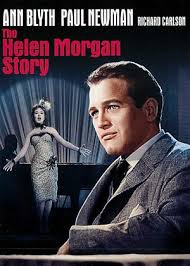
THE HELEN MORGAN STORY
US, 1957, 118 minutes, Black and white.
Ann Blyth, Paul Newman, Richard Carlson, Gene Evans, Alan King, Cara Williams.
Directed by Michael Curtiz.
The Helen Morgan Story is of interest as yet another biopic of a popular singing star of the '20s and an example of Paul Newman's early acting career. Helen Morgan was a torch singer in Prohibition days and appeared in Showboat on Broadway. She appeared in such films as Applause in 1930 and reprised her role as Julie in the 1935 film version of Showboat. In 1955 James Cagney and Doris Day had success in Love Me Or Leave Me, the picture of Ruth Etting, a torch singer with racketeer connections. The Helen Morgan Story is in this vein though not nearly as successful. Ann Blyth, an attractive actress and singer, is dubbed by Gogi Grant for this film. Paul Newman does what he can with a gangster role - which seems somewhat implausible. The film was directed by Michael Curtiz, a director who turned his hand to all kinds of genres, and made several of Doris Day's musicals as well as the drama with Kirk Douglas, Young Man With A Horn. Several screenwriters receive credit for the screenplay - which may indicate difficulties in writing the film; it certainly appears to be sketchy and an outline of a film rather than an in-depth exploration of a character and her times.
1. The popularity of the biopic - the star, show business, career, failure, relationships? Audience expectation of this kind of film? How successful this example?
2. The traditions of the story of stars - A Star Is Born as the basic plot? The rise after hard beginnings, peak of success, failure? The atmosphere of the '20s and Prohibition. gangsters? Goals of success on Broadway? The conventions - and cliches? The mixture of fact and fiction? The seamy side of life? The impact of this kind of film in the '50s, now?
3. Black and white photography, creation of the period, the musical score and its quality, its placement for thews throughout the film? Ann Blyth being dubbed?
4. The portrait of Helen Morgan - audience knowledge of her and her career, symbolising the hard-struggling actress of the '20s? Ann Blyth and her presence? Helen Morgan's origins, working with Larry at the sideshow in Chicago, being stood up by him and her love for him? Mixing with the gangs, Prohibition, the speakeasies in the cities? Auditions, success with the help of Larry? Her being persuaded to go into the Queen of Canada competition and the discovery of the fraud? The encounter with Russell Wade and what it led to? Greater success, her own club with Russell's money? The raids - and gangsters tipping off the police? Her opportunity in Showboat, her world tour? The difficulties of her personal relationships - love-hate for Larry? His using her and leaving her? Russell and his wife? Her turning to drink? Her decision to get the doctor for Larry after the shoot-out and his going to prison? Her collapse and his visiting her in hospital? The sentimental ending? Fact and fiction? The strengths and weaknesses of the screenplay - a sketch or a portrait of an actress? How much insight? How much conventional material?
5. How well did the film fill in the background of the '20s and Prohibition? The role of the law? The bootleggers? Deals, cover-ups, customs? Police raids and imprisonment, the law? The prison sequence - with Helen in prison (and the comic woman there) and the contacts with Wade? The pros and cons of Prohibition?
6. The show business story - the humble origins, auditions, the selection of songs (especially from Showboat)? The Showboat songs with reference to Larry? Ziegfeld and his presence in New York? Helen and her success in the show – her drinking and collapse?
7. Larry and his work at the carnival, his love for Helen and leaving her? The Canada deal and transporting the liquor? His connections, rise to success, friendship with Ben? The deal with Wade for the setting up of the club? The raids? The other women and his ignoring Helen, his visit to her in her apartment? The plan and the shoot-out? Imprisonment, the visit to the hospital? How plausible his arranging the tribute at the end? Paul Newman's presence and style?
8. The character of Russell - as judge on the Queen of Canada competition, his dating of Helen, his wife and her later visit? His being persuaded to set up the club by Larry? Helen's discovery of the truth? The up-and-coming lawyer with shady background?
9. Ben and his friendship with Larry, Dolly and her getting Ben to marry her? The support for Helen?
10. The portrait of the police, the action against Prohibition? The friendly policeman and his allowing Larry to visit Helen in hospital?
11. The themes of the need for success, gifts for entertainment, broken relationships, the stress of circumstances, failure in life, the possibilities for success? An American story?
Published in Movie Reviews
Published in
Movie Reviews
Tagged under